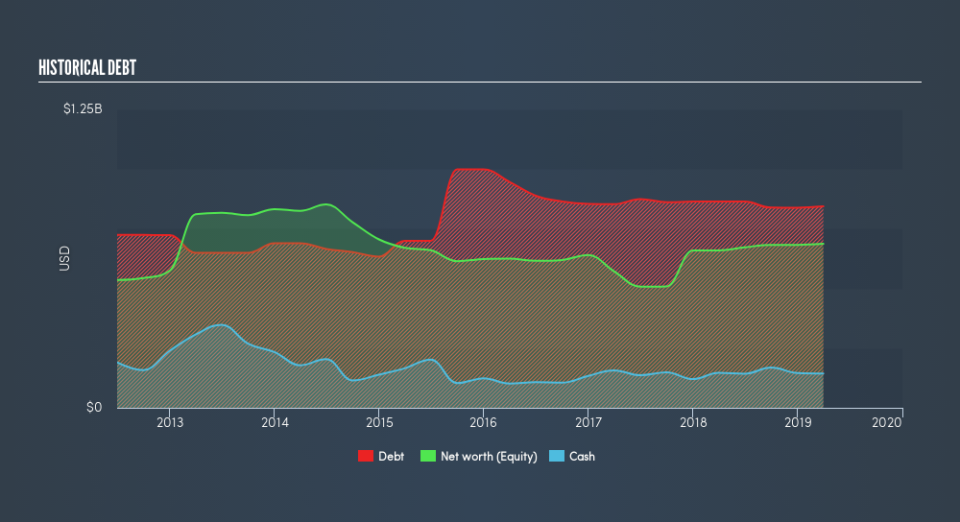What Does SunCoke Energy, Inc.'s (NYSE:SXC) Balance Sheet Tell Us About It?

Want to participate in a short research study? Help shape the future of investing tools and you could win a $250 gift card!
Investors are always looking for growth in small-cap stocks like SunCoke Energy, Inc. (NYSE:SXC), with a market cap of US$521m. However, an important fact which most ignore is: how financially healthy is the business? Evaluating financial health as part of your investment thesis is essential, since poor capital management may bring about bankruptcies, which occur at a higher rate for small-caps. We'll look at some basic checks that can form a snapshot the company’s financial strength. Nevertheless, this is just a partial view of the stock, and I suggest you dig deeper yourself into SXC here.
Does SXC Produce Much Cash Relative To Its Debt?
SXC's debt level has been constant at around US$844m over the previous year including long-term debt. At this stable level of debt, SXC's cash and short-term investments stands at US$144m , ready to be used for running the business. Moreover, SXC has produced US$164m in operating cash flow in the last twelve months, resulting in an operating cash to total debt ratio of 19%, meaning that SXC’s operating cash is less than its debt.
Does SXC’s liquid assets cover its short-term commitments?
Looking at SXC’s US$218m in current liabilities, it seems that the business has been able to meet these commitments with a current assets level of US$387m, leading to a 1.78x current account ratio. The current ratio is calculated by dividing current assets by current liabilities. For Metals and Mining companies, this ratio is within a sensible range as there's enough of a cash buffer without holding too much capital in low return investments.
Can SXC service its debt comfortably?
With total debt exceeding equity, SXC is considered a highly levered company. This is somewhat unusual for small-caps companies, since lenders are often hesitant to provide attractive interest rates to less-established businesses. We can test if SXC’s debt levels are sustainable by measuring interest payments against earnings of a company. Ideally, earnings before interest and tax (EBIT) should cover net interest by at least three times. For SXC, the ratio of 2.43x suggests that interest is not strongly covered, which means that debtors may be less inclined to loan the company more money, reducing its headroom for growth through debt.
Next Steps:
Although SXC’s debt level is towards the higher end of the spectrum, its cash flow coverage seems adequate to meet obligations which means its debt is being efficiently utilised. This may mean this is an optimal capital structure for the business, given that it is also meeting its short-term commitment. I admit this is a fairly basic analysis for SXC's financial health. Other important fundamentals need to be considered alongside. I suggest you continue to research SunCoke Energy to get a better picture of the small-cap by looking at:
Future Outlook: What are well-informed industry analysts predicting for SXC’s future growth? Take a look at our free research report of analyst consensus for SXC’s outlook.
Valuation: What is SXC worth today? Is the stock undervalued, even when its growth outlook is factored into its intrinsic value? The intrinsic value infographic in our free research report helps visualize whether SXC is currently mispriced by the market.
Other High-Performing Stocks: Are there other stocks that provide better prospects with proven track records? Explore our free list of these great stocks here.
We aim to bring you long-term focused research analysis driven by fundamental data. Note that our analysis may not factor in the latest price-sensitive company announcements or qualitative material.
If you spot an error that warrants correction, please contact the editor at editorial-team@simplywallst.com. This article by Simply Wall St is general in nature. It does not constitute a recommendation to buy or sell any stock, and does not take account of your objectives, or your financial situation. Simply Wall St has no position in the stocks mentioned. Thank you for reading.

